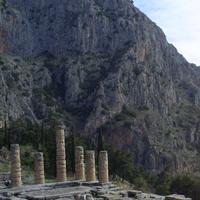Ulixes 5 (Ritchie's Fabulae Faciles)
Ulysses 5 (Ritchie's Easy Tales)
Cyclopes autem pastores erant quidam qui insulam Siciliam et praecipue montem Aetnam incolebant; ibi enim Volcanus, praeses fabrorum et ignis repertor, cuius servi Cyclopes erant, officinam suam habebat.
|||||||||especially|||||||chief of craftsmen||||discoverer of fire|||||workshop||
The Cyclopes, however, were some shepherds who inhabited the island of Sicily, and chiefly Mount Etna; for there Vulcan, the chairman of the architect's and the inventor of the fire, whose slaves were the Cyclops, had his factory.
サイクロプスは牧羊者であり、シチリア島と特にエトナ山に住んでいた。そこには、火と金属工芸師の長であるヴォルカーノ(ウォルカーヌス)がオフィスを持つサービスを提供するサイクロプスという名前の奴隷がいた。
Graeci igitur simul ac monstrum viderunt, terrore paene exanimati in interiorem partem speluncae refugerunt et se ibi abdere conabantur.
||||||||almost lifeless|||||||||hide themselves there|
The Greeks, therefore, as soon as they saw the monster, almost paralyzed by terror, fled to the innermost part of the cave, and endeavored to hide themselves there.
したがって、ギリシャ人たちは怪物を見ると、おびえて洞窟の奥に逃げ込み、そこで身を隠そうとした。
Polyphemus autem (sic enim Cyclops appellabatur) pecus suum in speluncam compulit; deinde, cum saxo ingenti portam obstruxisset, ignem in media spelunca fecit.
||||||flock or herd||||"drove" or "forced in"|||||||||||
But Polyphemus (for he was so called a Cyclops) drove his cattle into a cave; then, when he had blocked the gate with a huge stone, he made fire in the middle of the cave.
そして、ポリュペーモス(サイクロプスと呼ばれる)は群れを洞窟に追いやり、巨大な岩で扉を塞ぎ、洞窟の中央に火をつけた。
Hoc facto, oculo omnia perlustrabat, et cum sensisset homines in interiore parte speluncae esse abditos, magna voce exclamavit: "Qui homines estis?
||||"was surveying"||||||||||hidden away||||||
Having done this, he scanned all things with his eye, and when he perceived that men were hid in the inner part of the cave, he cried out with a loud voice: Who are you men?
これを行った後、彼は目ですべてを調べて、洞窟の奥に人々が隠れていることに気づいた時、大声で叫びました: "あなたたちは誰ですか?
Mercatores an latrones?"
||"Thieves" or "robbers"
Merchants or robbers?
商人なのか、盗賊なのか?"
Tum Ulixes respondit se neque mercatores esse neque praedandi causa venisse; sed a Troia redeuntis vi tempestatum a recto cursu depulsos esse.
||||||||for plundering purposes||"had come"||||"returning from"|||||||
Then Ulysses replied that he had neither been merchants nor had come for the purpose of plundering; but that they had been driven from the right course by the force of storms, when he was returning from Troy.
その後、ユリクセスは商人でもなく、略奪のためにやって来たのでもないと答えた。トロイアから帰る途中で、悪天候の力で正しい航路から逸れたのだと。
Oravit etiam ut sibi sine iniuria abire liceret.
He also prayed that he might be allowed to go away without injury to him.
彼は、自分に不公正な扱いなくして去ることが許されることも祈った。
Tum Polyphemus quaesivit ubi esset navis qua vecti essent; sed Ulixes cum sibi maxime praecavendum esse bene intellegeret, respondit navem suam in rupis coniectam omnino fractam esse.
||"asked"|||||carried, transported, conveyed|||||||"must be avoided"||||||||rocks||||
Then Polyphemus asked where the ship was and where they were riding; but Odysseus, when he perceived that it was well to take great precautions against himself, replied that his ship had been thrown into a rock, and had been broken entirely.
するとポリュペーモスは、乗ってきた船はどこかと尋ねた。しかし、ユリクシーズは自分が非常に用心すべきだと良く理解していたので、自分の船が完全に崩壊して岩場に投げ込まれていると答えた。
Polyphemus autem nullo responso dato duo e sociis manu corripuit, et membris eorum divulsis carnem devorare coepit.
|||||||||seized|||||||
But Polyphemus, without giving an answer, seized two of his allies by the hand, and began to devour the flesh, tearing apart their limbs.
しかし、ポリュペーモスは何の返事もせずに、仲間の2人を掴んで、彼らの手足を引き裂いて肉を食べはじめた。

